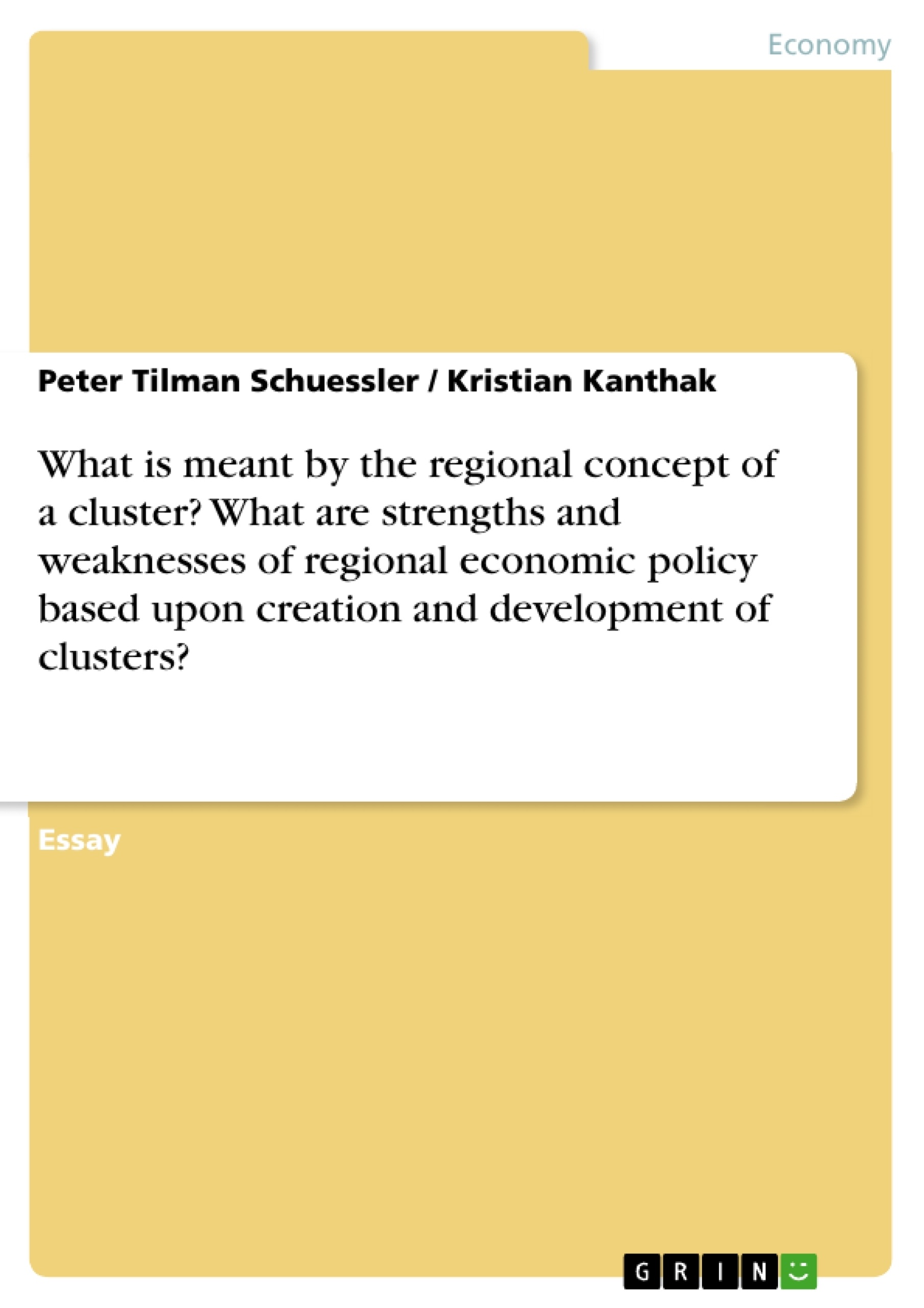Clusters can be motors for regions. They are supposed to reduce unemployment, ensure growth and wealth. This essay will discuss the question critically whether regional economic policy is able to create and enforce those new industrial districts. The limited extent of this text forces us to describe the topic nearly without examples; it is also not possible to mention all theoretical approaches in depths, it was rather just necessary to combine different ideas (e.g. in the definition part).
It will be shown that there is still a lot of academic work to be done until the phenomenon of regional cluster will be utterly understood. Nevertheless it will become clear that the strength of the policy is that there are many possibilities to affect the growth and evolution of clusters. Yet, most of them have several weaknesses to be thought of.
Due to the fact that most clusters have been created or came into existence throughout decades, a change in policy makers` minds will be necessary. They have to accept that building up successful clusters is not possible within a short term perspective.
Inhaltsverzeichnis (Table of Contents)
- What is meant by the regional concept of a cluster?
- Conditions/Framework for Clusters
- Possible starting points of regional policy on the creation and development of clusters
- Strengths and Weaknesses
- Conclusion
Zielsetzung und Themenschwerpunkte (Objectives and Key Themes)
This essay critically analyzes the potential of regional economic policy to foster the creation and development of industrial clusters. It examines the strengths and weaknesses of such policies, while acknowledging the limitations of the text and the complexities of the topic.
- Defining the concept of a cluster and its components
- Identifying the necessary conditions for successful cluster formation
- Examining the role of regional policy in creating and nurturing clusters
- Analyzing the strengths and weaknesses of cluster-based regional economic policy
- Highlighting the need for long-term commitment and collaborative efforts to achieve successful cluster development
Zusammenfassung der Kapitel (Chapter Summaries)
- What is meant by the regional concept of a cluster? This chapter explores the definition of a cluster, emphasizing its core components, including geographic proximity, interconnected companies, specialized suppliers, and shared local institutions. The chapter also highlights the economic benefits that clusters offer participating companies, such as reduced production costs and access to knowledge sharing.
- Conditions/Framework for Clusters This chapter identifies essential conditions that clusters need to thrive, including infrastructure, institutional linkages, a specialized workforce, and a supportive local environment. It emphasizes the importance of factors like knowledge spillover, shared learning opportunities, and a vibrant demand side to promote successful cluster development.
- Possible starting points of regional policy on the creation and development of clusters This chapter discusses the role of regional policy in facilitating cluster creation and development. It explores policy measures that can contribute to a supportive environment, including infrastructure development, fostering collaboration, and promoting innovation. The chapter acknowledges the limitations of policy intervention and emphasizes the importance of companies' decisions and technical changes in driving cluster growth.
Schlüsselwörter (Keywords)
The core concepts explored in this text include industrial clusters, regional economic policy, knowledge spillover, institutional thickness, infrastructure development, collaborative efforts, and long-term commitment. These keywords represent the central focus of the analysis, which examines the potential and limitations of regional policy in shaping the success of clusters as drivers of regional growth and economic development.
Frequently Asked Questions
What is the regional concept of a cluster?
A cluster is a geographic concentration of interconnected companies, specialized suppliers, and service providers in a particular field that compete and cooperate.
Can regional economic policy create successful clusters?
While policy can provide support and framework conditions, the essay suggests that creating clusters from scratch is difficult and requires a long-term perspective.
What are the strengths of cluster-based economic policy?
Strengths include fostering innovation, reducing unemployment, and promoting regional growth through knowledge sharing and shared infrastructure.
What are the weaknesses of this policy approach?
Weaknesses include the risk of "lock-in" effects, dependency on a single industry, and the fact that clusters often take decades to develop naturally.
What is "knowledge spillover" in a cluster?
It refers to the informal exchange of ideas and information between employees of different companies within the same geographic area, which boosts innovation.
- Citar trabajo
- Peter Tilman Schuessler (Autor), Kristian Kanthak (Autor), 2002, What is meant by the regional concept of a cluster? What are strengths and weaknesses of regional economic policy based upon creation and development of clusters?, Múnich, GRIN Verlag, https://www.grin.com/document/8905



